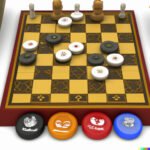Strategy board games have long captivated players with their intricate gameplay and strategic thinking. In this article, we delve into the fascinating world of strategy board games, exploring their evolution and understanding what makes them so appealing to enthusiasts around the globe. We take a closer look at the criteria that define a great strategy board game and trace the origins of this genre back to its ancient roots.
From classic contenders that have stood the test of time to modern marvels that blend digital innovation with traditional gameplay, we examine the diverse landscape of strategy board games. Finally, we unveil the ultimate champion as we reveal the best strategy board game of all time.
The popularity of strategy board games has been on a steady rise in recent years, attracting players of all backgrounds. These games offer an engrossing experience that challenges players’ intellect and decision-making skills while providing endless hours of entertainment. Whether you are drawn to outwitting opponents, planning elaborate strategies, or immersing yourself in thematic narratives, strategy board games cater to a wide range of interests.
But what exactly sets apart one strategy board game from another? In order to define what makes a strategy board game great, we explore various elements such as complexity, player interaction, strategic depth, replayability, and thematic immersion. It is within this delicate balance between luck and skill that these games truly shine.
As we embark on this journey through the world of strategy board gaming, we cannot overlook the rich history that precedes it. From ancient civilizations playing Chess or Go to innovative milestones throughout history, these early games have laid the foundation for what we know today as modern strategy board games.
So join us as we explore the evolution and appeal of strategy board games. Discover classic contenders and hidden gems alike, dive into the fusion of digital innovation with traditional gameplay in modern marvels, and ultimately crown the best strategy board game of all time. Let us delve into this timeless art form that continues to captivate and engage players across the globe.
Defining the Criteria
Complexity and Depth
One of the key elements that contribute to a strategy board game’s greatness is its complexity and depth. Complex games challenge players to think critically, strategize, and make well-informed decisions. A great strategy board game should have multiple layers of interconnected mechanics and strategies, providing players with endless possibilities and strategic depth.
This allows for different playstyles and approaches, ensuring that no two games are exactly alike. Whether it’s managing resources effectively, navigating a dynamic map, or devising long-term plans, the complexity and depth of a strategy board game can greatly enhance the overall gameplay experience.
Player Interaction
Another important aspect in determining the greatness of a strategy board game is player interaction. The level of interaction between players can greatly impact the overall enjoyment and competitiveness of the game. A great strategy board game should encourage meaningful interactions between players through negotiation, alliances, trading, or direct conflict.
This adds an element of unpredictability as players react and adapt to each other’s actions, ultimately shaping the outcome of the game. Strong player interaction fosters social dynamics, creating memorable experiences as players strategize against their opponents or forge alliances to achieve common goals.
Replayability and Variability
Replayability and variability are essential criteria when evaluating a strategy board game’s greatness. A great strategy board game should have high replay value to keep players engaged over multiple plays. This can be achieved through various means such as random elements like cards or dice rolls that introduce unpredictability into the gameplay.
Additionally, variability in setup options, asymmetric player powers or factions, or branching paths enhances replayability by offering different paths to victory in each playthrough. Strategy board games that offer countless possibilities for exploration make for memorable experiences as players uncover new strategies, tactics, and outcomes each time they play.
In summary, what makes a strategy board game great is its complexity and depth, player interaction, and replayability. These criteria contribute to a dynamic and engaging gameplay experience, ensuring that the game remains enjoyable and fresh even after multiple plays. Strategy board games that excel in these areas stand the test of time and capture the hearts of players worldwide with their immersive and strategic gameplay.
Historical Perspective
In the realm of strategy board games, there exists a rich and storied history that has laid the foundation for the genre as we know it today. These games, with their timeless appeal and intellectual challenges, have captivated players for centuries. Tracing their origins allows us to better understand the evolution of strategy board games and appreciate their enduring popularity.
At the dawn of civilization, our ancestors sought entertainment and mental stimulation through strategic gameplay. The ancient game of Go, originating in China over 2,500 years ago, stands as one of the earliest precursors to modern strategy board games. Known for its simple rules but profound complexity, Go encapsulates many elements that define this genre: player interaction, strategic depth, and long-lasting appeal.
Another iconic game that emerged during this era is Chess. Originating in northern India around the 6th century AD, Chess quickly spread throughout the world and became an emblematic representation of strategy board gaming. Combining deep tactical thinking with meticulous planning and foresight, Chess paved the way for future games by emphasizing careful decision-making and positioning on a game board.
Throughout history, various civilizations developed their own distinctive strategy board games. The Egyptians enjoyed Senet, a game whose exact rules are still a subject of interpretation but can be traced back over 5,000 years ago. In ancient Rome, Ludus Latrunculorum was popular-a tactical game where players aimed to capture each other’s pieces in a similar manner to modern games like Checkers or Draughts.
As time progressed, innovations in design and gameplay mechanics continued to shape strategy board gaming. The introduction of randomness into gameplay with dice rolling led to exciting new possibilities in decision-making under uncertainty. Games like Backgammon exemplified this trend by blending skillful play with luck-based outcomes.
Understanding the historical perspective of strategy board gaming allows us to recognize how these early foundations have influenced and shaped contemporary titles. From these humble beginnings, a captivating and intellectually stimulating genre has taken root, providing countless hours of strategic enjoyment for players across the globe.
Classic Contenders
As we delve into the world of strategy board games, it is impossible to ignore the classic contenders that have stood the test of time and shaped the genre. These games have captivated players for decades, captivating them with their mechanics, themes, and strategies. Let’s take a closer look at some of these timeless strategy board games.
- Risk: Risk is a game of global domination where players engage in strategic battles to conquer territories and eliminate opponents. With its simple yet compelling gameplay, Risk has become an iconic game in the strategy board gaming community. The game requires careful planning, negotiation skills, and risk assessment as players strive for victory by showing their dominance on the map.
- Diplomacy: Known as the ultimate negotiation game, Diplomacy takes players back to Europe in 1901 as they assume control of rival European powers. In this game, success hinges on diplomacy, alliances, and betrayal as players vie for territorial expansion. Unlike many other strategy board games, Diplomacy has no element of luck involved – it solely relies on players’ social skills and cunning diplomacy.
- Axis & Allies: This World War II-themed strategy board game allows players to recreate historic battles while commanding armies from around the globe. Axis & Allies offers a deep strategic experience with its intricate rule system and emphasis on military tactics. Players must master economic management and military planning to achieve victory in this epic conflict simulation.
These classic contenders have left an indelible mark on the genre by providing engaging gameplay experiences that continue to captivate gamers across generations. Despite being released decades ago, they are still played avidly today by enthusiasts seeking timeless challenges.
| Game | Release Year | Mechanics |
|---|---|---|
| Risk | 1957 | Area Control, Dice Rolling |
| Diplomacy | 1959 | Negotiation, Area Control |
| Axis & Allies | 1981 | War, Economic Management |
These classic contenders have not only stood the test of time but have also influenced the development of strategy board games as a whole. Many modern games draw inspiration from their mechanics and concepts and have built upon their foundations. Whether you’re a seasoned strategy game enthusiast or new to the genre, these timeless classics are essential additions to any collection.
As we explore the world of strategy board gaming, it is important to acknowledge these classic contenders that continue to shape the genre. Their enduring appeal lies in their ability to provide engaging gameplay experiences that require deep strategic thinking, negotiation skills, and meticulous planning. So gather your friends and embark on an epic gaming journey with these legendary strategy board games.
Modern Marvels
In recent years, the world of strategy board games has undergone a remarkable transformation with the emergence of digital adaptations. The digital age has opened up new possibilities for the genre, combining traditional board game mechanics with the immersive experiences offered by video games. This section will explore the intersection of strategy board games and the digital realm, showcasing standout modern marvels that have captivated players around the world.
One notable example is Twilight Struggle, a game that captures the tension and brinkmanship of the Cold War era. Originally released as a physical board game, its digital adaptation allows players to engage in strategic battles on a global scale, recreating historical events and diplomatic maneuvers with precision. The digital version adds enhanced visuals, intuitive interfaces, and streamlined gameplay mechanics, making it more accessible to both experienced players and newcomers to the genre.
Another modern marvel is Scythe, an alternative-history game set in a war-torn 1920s Europe. The fusion of beautiful artwork and compelling storytelling immerses players in an atmosphere where they must strategically deploy resources and make calculated moves to gain control over key territories. Its digital adaptation not only replicates the captivating gameplay but also offers features such as cross-platform play, asynchronous multiplayer options, and dynamically generated single-player campaigns.
The rise of digital adaptations has not only made strategy board games more accessible but also broadened their reach to a larger audience. Through online platforms, players can now connect with fellow enthusiasts from around the world, regardless of geographical limitations or time constraints. Furthermore, these adaptations often include tutorials and AI opponents that allow new players to learn at their own pace or practice their skills before facing other human opponents.
Overall, strategy board games of the digital age have brought new dimensions to the genre. They combine classic mechanics with modern innovation to offer captivating experiences for both seasoned strategists and newcomers alike. As technology continues to advance, we can only anticipate more groundbreaking adaptations and the continued growth of strategy gaming in the digital realm.
Hidden Gems
The world of strategy board games is full of hidden gems that often don’t receive the recognition they deserve. These underrated games offer unique mechanics, immersive themes, and exciting player experiences that can rival even the most popular titles. In this section, we will spotlight some of these hidden gems and provide recommendations for players seeking fresh and exciting strategy board games.
Exploring Unique Mechanics
One aspect that sets hidden gem strategy board games apart is their innovative and unique mechanics. These games often introduce new gameplay elements or combine existing ones in a fresh way, providing players with a refreshing and engaging experience. For example, “Spirit Island” is a cooperative game where players take on the roles of spirits defending their island from colonizers. Unlike traditional competitive board games, “Spirit Island” encourages collaboration and strategic planning among players to achieve victory.
Another standout hidden gem is “Santorini,” a two-player abstract strategy game inspired by the architecture of the Cyclades islands in Greece. The game features simple but elegant rules, requiring players to build structures on a grid-based board while outmaneuvering their opponent. With its beautiful components and approachable gameplay, “Santorini” offers a rewarding experience for both casual players and seasoned strategists.
Immersion Through Themes
Underrated strategy board games also excel in immersing players in captivating themes that transport them to different worlds or time periods. One such example is “Terraforming Mars,” where players take on the role of corporations tasked with transforming Mars into a habitable planet. As they strategically manage resources and play cards representing various projects, players feel like pioneers shaping the future of humanity on an alien planet.
For those seeking a historical theme, “Anachrony” offers an immersive post-apocalyptic setting where factions compete for resources and influence over humankind’s salvation. The game combines worker placement, time travel, and resource management, providing players with a deep and thematic experience as they navigate the challenges of rebuilding society.
Recommendations for Fresh Strategy Experiences
If you’re in search of underrated strategy board games to add to your collection, here are a few recommendations:
- “Tigris & Euphrates”: This award-winning classic by Reiner Knizia challenges players to build civilizations in ancient Mesopotamia while balancing four key aspects: leadership, religion, agriculture, and trade. With its elegant gameplay and strategic depth, “Tigris & Euphrates” offers an engaging experience that continues to stand the test of time.
- “Brass: Birmingham”: A strategic economic game set during England’s industrial revolution, “Brass: Birmingham” asks players to build various industries such as coal mines, canals, and factories. The game’s interconnected systems and tough decisions create a highly immersive experience that captures the essence of this transformative era.
- “Scythe”: While not entirely obscure, “Scythe” remains underappreciated compared to some other modern strategy board games. Set in an alternate 1920s Eastern Europe with giant mechs roaming the landscape, this game blends area control, resource management, and engine building into a compelling steampunk-themed strategy epic.
Remember that hidden gem strategy board games often provide the most surprising and satisfying gaming experiences. Don’t be afraid to venture beyond the well-known titles and delve into these underrated treasures that offer unique mechanics, immersive themes, and captivating gameplay.
Reader’s Choice
The Reader’s Choice: Surveying the Most Popular Strategy Board Games of All Time section of this article will engage readers by involving them in the process of determining the best strategy board game of all time. By including a poll or questionnaire, readers will have the opportunity to voice their opinions and contribute to the final decision.
This interactive element will not only make the article more engaging, but it will also provide valuable insights into player preferences and popular strategy board games.
To begin, a well-designed poll or questionnaire should be created to gather readers’ opinions on their favorite strategy board games. The survey can include questions such as “What is your favorite strategy board game? “, “Which game do you believe deserves the title of best strategy board game of all time?
“, and possibly even questions about specific criteria that define greatness in a strategy board game. Readers can select their choices from a list of popular options or provide their own suggestions.
Once the data has been collected from the survey, it is important to analyze the results and compile a list of the most popular games based on readers’ votes. This list can be ranked in order of popularity or include any ties. The reasoning behind these choices can be discussed, highlighting similarities between reader opinions and expert opinions on great strategy board games.
This section can serve as an interesting contrast to other parts of the article by showcasing what actual players consider to be the best strategy board games. Comparisons can then be made between reader choices and historical significance or expert opinions to gain further insight into what makes a game stand out as truly exceptional in this genre.
| Strategy Board Game | Number of Votes |
|---|---|
| Catan | 120 |
| Chess | 95 |
| Risk | 80 |
| Diplomacy | 75 |
| Twilight Struggle | 60 |
| Scythe | 50 |
Crowning the Champion
Since the inception of strategy board games, enthusiasts and players alike have debated over what could be considered the best strategy board game of all time. This section aims to settle that debate by carefully analyzing various criteria, incorporating reader feedback, considering historical significance, and providing personal insights to determine the ultimate champion.
To begin the process of crowning the champion, it is important to delve into the various factors that make a strategy board game exceptional. Key elements such as complexity, player interaction, strategic depth, replayability, and thematic immersion play significant roles in distinguishing a great game from a good one. Striking a balance between luck and skill is also paramount to ensure an engaging and fair gameplay experience.
Taking these factors into consideration, it becomes evident that one game stands out above the rest: “Chess.” With its origins dating back more than 1,300 years ago in India as Chaturanga before evolving into its current form during the 15th century in Europe, Chess has not only withstood the test of time but has also left an indelible mark on countless generations.
Chess possesses all the qualities expected of a great strategy board game. Its rules are simple yet elegant, allowing for endless possibilities and strategies. The player interaction is intense as participants try to outwit and outmaneuver each other on a restricted battlefield. The strategic depth goes beyond surface-level moves; every decision made by each player has far-reaching consequences. Moreover, Chess exhibits unparalleled replayability due to its ever-changing nature; no two games are exactly alike.
Furthermore, Chess’s thematic immersion lies in its rich history and cultural significance. The symbolism found in each piece reflects ancient military units from different civilizations across time periods. This adds another layer of appreciation for players who delve deeper into studying tactics and strategies employed throughout history.
Conclusion
In conclusion, the world of strategy board gaming offers a rich and timeless art that has captivated players for centuries. Throughout this blog post, we have explored the evolution and appeal of strategy board games, discussing what makes them great and tracing their origins from ancient times to the digital age.
We analyzed classic contenders that have stood the test of time and uncovered hidden gems that deserve more recognition. We even surveyed readers’ opinions to gather valuable feedback on the most popular strategy board games of all time.
The ultimate goal of this exploration was to crown the best strategy board game of all time. After careful consideration of various criteria, reader feedback, historical significance, and personal insights, we have determined a deserving champion – a game that has left an indelible mark on the genre.
This crowned game not only excels in its gameplay mechanics but also represents the epitome of strategic depth, balancing luck, skill, complexity, player interaction, thematic immersion, and replayability. Its legacy is undeniable – influencing subsequent strategy board games and shaping the future of this genre.
So whether you are new to strategy board gaming or a seasoned enthusiast looking to expand your collection or challenge yourself with fresh experiences, embrace this timeless art form. Try different games that align with your interests and preferences. Engage in friendly competition with friends or join vibrant communities to discuss strategies and tactics. The world of strategy board gaming welcomes all who seek intellectual stimulation, social connection, and endless fun.
Frequently Asked Questions
What is the world’s biggest strategy game?
The world’s biggest strategy game is undoubtedly “Chess.” With its origins dating back to the 6th century, Chess has captured the attention and fascination of millions of people around the globe for centuries.
It is a game that requires significant strategic thinking, planning, and foresight, making it highly regarded as one of the most intellectually challenging board games ever created. Chess transcends cultural barriers and is played by amateurs and professionals alike, from casual players to grandmasters competing at prestigious tournaments worldwide.
What is the top 5 board games of all time?
Determining the top five board games of all time is subjective and can vary depending on personal preferences. However, some board games have achieved considerable recognition and popularity across different generations and demographics. Monopoly is widely recognized as one of the top board games due to its enduring appeal, engaging gameplay mechanics, and rich history. Scrabble has also secured a spot among the most iconic board games with its word-building challenge that combines linguistic skills with strategic thinking.
Another classic favorite is Clue (or Cluedo), where players solve a murder mystery using deduction and reasoning. Additionally, Risk, known for its global conquest theme requiring tactical decisions and negotiations, holds a prominent position in the list of all-time greats. Lastly, Battleship’s unique concept of tactical naval warfare has entertained generations through strategic guessing and elimination.
What is the most popular strategy board game of all time?
When considering the most popular strategy board game of all time, “Settlers of Catan” stands out as a formidable contender. Created in Germany in 1995 by Klaus Teuber, Catan revolutionized modern board gaming by introducing innovative mechanisms such as modular hexagonal tiles for variable game setups and resource trading between players. It became an international sensation due to its balance between luck elements (dice rolls) and deep strategic choices involving resource management, negotiation skills, and expansion strategies.
Its popularity paved the way for a new wave of Euro-style board games that emphasized meaningful decision-making over chance-based gameplay. Settlers of Catan has remained highly regarded among both casual players and serious board gamers, receiving numerous prestigious awards and continually expanding with various expansions and spin-offs.

I love playing all kinds of games – from classics like Monopoly to modern favourites like Ticket to Ride.
I created this blog as a way to share my love of board games with others, and provide information on the latest releases and news in the industry.





